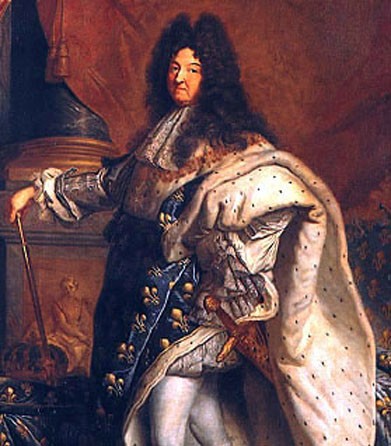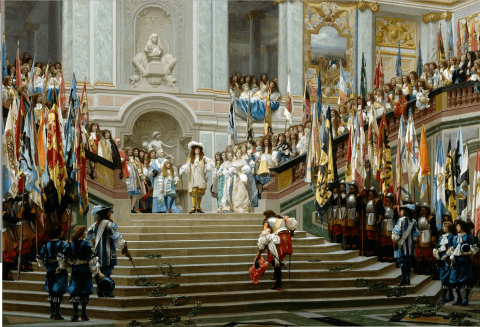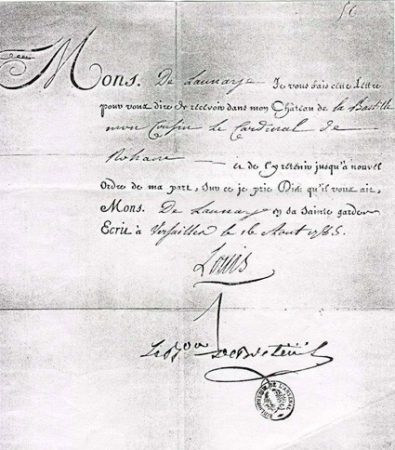
To understand the political causes of the French Revolution, one must first understand the nature of royal government. France’s government and bureaucracy had been expanded and modernised by Louis XIV in the second half of the 1600s. This created the foundations for a modern national government but it also left future kings with some critical problems, most notably the cost of maintaining the state.
Rule by divine right
According to the political doctrine of the era, France was an absolutist, divine right monarchy. It was governed by kings who believed they were sovereign and all-powerful because their authority was drawn from God.
In practice, however, the exercise of royal authority was neither perfect or unlimited. The French monarch certainly wielded considerable power but it was not absolute nor unchecked. The king could make appointments, formulate policy and issue arbitrary orders, such as lettres de cachet – but the king’s authority extended only as far as his power to implement and enforce his orders.
Between 1643 and 1792, France was ruled by just three Bourbon kings, all named Louis. Under the first of these kings, Louis XIV, royal power was increased and extended across France. His successors, however, found it difficult to assert similar levels of royal power over a nation that was rapidly changing and approaching bankruptcy.
The ‘Sun King’
The French monarchy reached its zenith under Louis XIV, the ‘Sun King’, who ruled between 1643 and 1715. As a child of nine, Louis was driven from his palaces during a bitter civil war that was instigated by the nobility and Paris parlements against the crown and royal ministers.
In 1661, shortly after Louis reached adulthood, he shocked the royal court by assuming absolute control of the government. He refused to select a high ranking aristocrat as his chief minister, instead choosing his ministers and officials on merit, including several commoners.
The new king took a close interest in matters of government, administration, policy, law and the military. He insisted on reviewing and signing important orders personally. He also ordered a series of military reforms and expanded the national standing army, ending his reliance on the armies of provincial noblemen.
Louis used religion to justify and reinforce his growing absolutism. The French monarchy, Louis claimed, was empowered by God, an endowment of divine right. When asked by a political emissary about the nature of the French state, Louis XIV is reported to have replied “Le t’at? C’est moi!” (‘The state? That’s me.’)
“Louis XIV design his government to ensure his authority. True enough, the mechanisms of authority were becoming increasingly bureaucratic, yet the monarch dominated. While Louis XIV sought to rule in a rational manner, he crafted his bureaucracy not to govern in his stead, but to ensure that he alone ruled… To a considerable degree, Louis limited or suppressed independent action among the agents of his authority, particularly in the case of his military commanders. More authority concentrated at court, under the direct supervision of the king. This made the roles of the king and those ministers around him all the more important, for at the top of the power structure stood very few individuals.”
John A. Lynn, historian
The power of Versailles
To enhance his own power, the ‘Sun King’ developed ways to marginalise his rivals and dilute the power of provincial nobles. The royal court at Versailles would become his greatest weapon.
In 1682, Louis XIV moved his court from the fortified castles of Paris to a newly constructed palace at Versailles, about 12 miles (19 kilometres) south-west of the capital. Versailles became one of Europe’s grandest palaces, with 2,153 rooms, 230 acres of gardens and 20 miles of roads and pathways.
Versailles was not just a royal showpiece, however, it became a de facto political prison for France’s provincial nobles. The king demanded the near-permanent attendance of significant noblemen at Versailles. Held at court, these nobles became politically ineffectual, idle and leisure loving. They spent most of their days engaging in frivolous court intrigues, gambling, hunting, balls and sexual romps. Customs and rituals at Versailles evolved to emphasise the king’s political supremacy and mystique.
Kept distant from their provincial bases, the nobles were unable to plot and scheme against the monarchy. Under Louis XIV, Versailles became a working model of the political idiom ‘keep your friends close and your enemies closer’.

Foreign wars and campaigns
Louis XIV also strengthened his monarchical power by involving France in several foreign wars and campaigns. During his reign, France was engaged in the War of Devolution (1667-68), the Franco-Dutch War (1672-78), the War of the Spanish Succession (1701-14) and other lesser conflicts.
These wars had a transformative effect on the nation. France’s national army became one of the most professional and successful military forces on the European continent. Territories like Flanders, Artois, Hainault, Alsace and Lorraine were acquired and absorbed into the French state.
Military victories consolidated Louis XIV’s authority in France and increased it abroad. They fuelled French nationalism, increased Louis’ personal prestige and strengthened public faith in the monarchy. War also provided Louis with a premise for expanding the national government. Military mobilisation required a national bureaucracy to collect revenue, organise and supply the army.
As a consequence, government departments and agencies grew rapidly during the reign of Louis XIV. It was said that at the beginning of Louis’ reign his foreign ministry could fit into a carriage but his death they filled a ballroom.
State debt and oppression

Most of these policies and changes were made arbitrarily by Louis XIV. He relied on experts for advice and entrusted ministers and administrators to implement his decisions. He did not stop to consult the parlements (France’s once powerful high courts) or the Estates General (the nation’s occasional assembly).
While these measures extended Louis XIV’s personal power, they left a litany of problems for France’s future monarchs. The Sun King’s constant warmongering, along with his grandiose spending and empire building at Versailles, drained the royal treasury. His wars were funded by state borrowing and increasing taxation, the burden of which invariably fell on France’s lower classes.
Secondly, with growing absolutism came an increase in state oppression. The royal government became ruthless in suppressing criticism, political dissent and religious heresy. Censorship of books and pamphlets increased under Louis XIV and his successor, Louis XV; so too did the use of lettres de cachet to arbitrarily detain individuals. Many radical and revolutionary writers, including Voltaire, Denis Diderot and Honore Mirabeau, fell foul of the state and spent time in prisons or exile during the mid 18th century.
A bloated bureaucracy
Thirdly and finally, the expansion of the national government under Louis XIV, while effective in the short term, was both haphazard and inefficient. New departments and offices were created but traditional and obsolete ones were rarely abolished.
The outcome was that France acquired a modern bureaucracy but it was created atop antiquated systems of privilege and inequality. While government expanded and the French economy modernised and capitalised, the social order remained dominated by the three Estates. The cost of maintaining this expanded national government increased but state revenue was dwindling.
By the time Louis XVI came to the throne in 1774, governing France had become extraordinarily difficult. In the absence of a legislature, the royal court remained the political heart of the nation – but its ability to develop and implement policy on a national scale was extremely limited. Tradition and mythology may have declared the new king an absolutist monarch – but his power was absolute in name only.

1. France before the revolution was an absolutist monarchy, in theory though not in practice. All political power and sovereignty were said to reside with the monarch, who derived his authority from God.
2. Royal absolutism was largely defined and expanded by Louis XIV, who ruled between 1643 and 1715. Louis moved the royal government to Versailles, involved France in several wars and greatly expanded the military and the state bureaucracy.
3. Louis XIV also minimised threats to his authority by requiring powerful provincial nobles to attend court at Versailles, where they were they became occupied with mundane activities and intrigues.
4. Louis XIV also reinforced his authority by not summoning the Estates General, bypassing the parlements and using instruments of state oppression, such as censorship and lettres de cachet.
5. By the time Louis XVI came to the throne in 1774, France’s economy was growing and modernising but its political and social systems had scarcely changed. Government had become extremely complex and the royal authority established by Louis XIV had dwindled.
Citation information
Title: ‘Royal government’
Authors: Jennifer Llewellyn, Steve Thompson
Publisher: Alpha History
URL: https://alphahistory.com/frenchrevolution/royal-government/
Date published: September 19, 2019
Date updated: November 6, 2023
Date accessed: July 27, 2024
Copyright: The content on this page is © Alpha History. It may not be republished without our express permission. For more information on usage, please refer to our Terms of Use.
